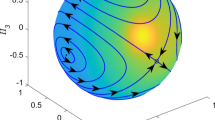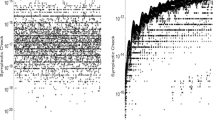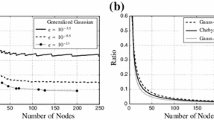Abstract
In this paper, a highly accurate and efficient Adaptive Local Variational Iteration Method (ALVIM) is presented to fulfil the need of the astrodynamics society for fast and accurate computational methods for guidance and control. The analytical iteration formula of this method is derived by using a general form of the first order nonlinear differential equations, followed by straightforward discretization using Chebyshev polynomials and collocation. The resulting numerical algorithm is very concise and easy to use, only involving highly sparse matrix operations of addition and multiplication, and no inversion of the Jacobian is required. Apart from the simple yet efficient iteration formula, a straightforward adaptive scheme is introduced to refine the step size and the collocation nodes at each time segment. The presented adaptive method guarantees prescribed accuracy without manual tuning of the algorithm. The computational cost of ALVIM, in terms of functional evaluations, is 1–2 orders of magnitude lower than adaptive finite difference methods. Numerical results of a large amplitude pendulum, perturbed two-body problem, and three-body problem validate the high accuracy and efficiency of this easy-to-use adaptive method.













Similar content being viewed by others
References
Liu, P.: Introducing computational guidance and control. J. Guid. Control Dyn. 40(2), 193 (2017)
Barrow-Green, J.: Poincaré and the Three Body Problem. 11. American Mathematical Society, Providence (1997)
Fox, K.: Numerical integration of the equations of motion of celestial mechanics. Celest. Mech. 33(2), 127–142 (1984)
Dormand, J., Prince, P.: A family of embedded Runge–Kutta formulae. J. Comput. Appl. Math. 6, 19 (1980)
Dormand, J., Prince, P.: A reconsideration of some embedded Runge–Kutta formulae. J. Comput. Appl. Math. 15, 203 (1986)
Dormand, J., Elmikkawy, M., Prince, P.: High-order embedded Runge–Kutta–Nystrom formulae. IMA J. Numer. Anal. 7, 423–430 (1987)
Hernandez, K., Elgohary, T.A., Turner, J.D., Junkins, J.L.: A novel analytic continuation power series solution for the perturbed two-body problem. Celest. Mech. Dyn. Astron. 131(10), 1–32 (2019)
Tasif, T.H., Elgohary, T.A.: A high order analytic continuation technique for the perturbed two-body problem state transition matrix. In: AAS/AIAA Space Flight Mechanics Meeting (2019)
Tasif, T.H., Elgohary, T.A.: An adaptive analytic continuation method for computing the perturbed two-body problem state transition matrix. J. Astronaut. Sci. 67(4), 1412–1444 (2020)
Tasif, T.H., Elgohary, T.A.: An adaptive analytic continuation technique for the computation of the higher order state transition tensors for the perturbed two-body problem. In: AIAA Scitech 2020 Forum, p. 0958 (2020)
Tasif, T.H., Elgohary, T.A.: A computation process for the higher order state transition tensors of the gravity and drag perturbed two-body problem using adaptive analytic continuation technique. In: 28th International Conference on Computational & Experimental Engineering and Sciences (ICCES) (2022)
Turner, J.D., Elgohary, T.A., Majji, M., Junkins, J.L.: High accuracy trajectory and uncertainty propagation algorithm for long-term asteroid motion prediction. In: Alfriend, K.T., Akella, M., Hurtado, J.E., Juang, J., Turner, J.D. (eds.) Adventures on the Interface of Mechanics and Control, pp. 15–34. AIAA, Reston (2012)
Montenbruck, O., Gill, E.: Satellite Orbits: Models, Methods and Applications. Springer, New York (2012)
Berry, M.: A variable-step double-integration multi-step integrator. Ph.D. thesis, Virginia Polytechnic Institute and State University, Blacksburg (2004)
Berry, M., Healy, L.: The generalized sundman transformation for propagation of high-eccentricity elliptical orbits. Adv. Astronaut. Sci. 112, 127–146 (2002)
Berry, M.M., Healy, L.M.: Implementation of Gauss–Jackson integration for orbit propagation. J. Astronaut. Sci. 52(3), 331–357 (2004)
Wang, X., Yue, X., Dai, H., Atluri, S.N.: Feedback-accelerated Picard iteration for orbit propagation and lambert’s problem. J. Guid. Control. Dyn. 40(10), 2442–2451 (2017)
Wright, K.: Some relationships between implicit Runge–Kutta, collocation, and Lanczos \(\tau\) methods, and their stability properties. BIT Numer. Math. 10, 217–227 (1970)
Jones, B., Anderson, R.: A survey of symplectic and collocation methods for orbit propagation. In: 22nd Annual AAS/AIAA Space Flight Mechanics Meeting, Charleston (2012)
Elgohary, T.A., Dong, L., Junkins, J.L., Atluri, S.N.: A simple, fast, and accurate time-integrator for strongly nonlinear dynamical systems. Comput. Model. Eng. Sci. 100(3), 249–275 (2014)
Elgohary, T.A., Junkins, J.L., Atluri, S.N.: An RBF-collocation algorithm for orbit propagation. In: Advances in Astronautical Sciences: AAS/AIAA Space Flight Mechanics Meeting (2015)
Elgohary, T.A.: Novel computational and analytic techniques for nonlinear systems applied to structural and celestial mechanics. Ph.D. thesis, Texas A &M University, College Station (2015)
Woollands, R.M., Bani Younes, A., Junkins, J.L.: New solutions for the perturbed lambert problem using regularization and Picard iteration. J. Guid. Control. Dyn. 38(9), 1548–1562 (2015)
Junkins, J., Woollands, R.: Nonlinear differential equation solvers via adaptive Picard–Chebyshev iteration: applications in astrodynamics. In: AAS/AIAA Astrodynamics Specialist Conference (2017)
Woollands, R., Junkins, J.L.: Nonlinear differential equation solvers via adaptive Picard–Chebyshev iteration: applications in astrodynamics. J. Guid. Control Dyn. 42, 1–16 (2018)
Bolatti, D.A., de Ruiter, A.H.: Galerkin variational integrators for orbit propagation with applications to small bodies. J. Guid. Control. Dyn. 42(2), 347–363 (2018)
Nielsen, P., Alfriend, K., Bloomfield, M., et al.: Continuing Kepler’s Quest: Assessing Air Force Space Command’s Astrodynamics Standards. The National Academics Press, Washington (2012)
Probe, A., Read, J., Macomber, B., Junkins, J.: Massively parallel implementation of modified Chebyshev Picard iteration for perturbed orbit propagation. In: Advances in Astronautical Sciences: AAS/AIAA Space Flight Mechanics Meeting (2015)
Hatten, N., Russell, R.P.: Parallel implicit Runge–Kutta methods applied to coupled orbit/attitude propagation. J. Astronaut. Sci. 64(4), 333–360 (2017)
Atallah, A., Bani Younes, A.: Parallel integration of perturbed orbital motion. In: AIAA SciTech Forum (2019)
Atallah, A.M., Woollands, R.M., Elgohary, T.A., Junkins, J.L.: Accuracy and efficiency comparison of six numerical integrators for propagating perturbed orbits. J. Astronaut. Sci. 67, 1–28 (2019)
Patterson, M.A., Hager, W.W., Rao, A.V.: A ph mesh refinement method for optimal control. Optim. Control Appl. Methods 36(4), 398–421 (2015)
Wang, X., Elgohary, T.A., Atluri, S.: An adaptive local variational iteration method for orbit propagation and strongly nonlinear dynamical systems. In: AIAA Scitech 2020 Forum, p. 0957 (2020)
Wang, X., Atluri, S.N.: A novel class of highly efficient and accurate time-integrators in nonlinear computational mechanics. Comput. Mech. 59(5), 861–876 (2017)
Wang, X., Xu, Q., Atluri, S.N.: Combination of the variational iteration method and numerical algorithms for nonlinear problems. Appl. Math. Model. 79, 243–259 (2020)
Fornberg, B.: A Practical Guide to Pseudospectral Methods. Cambridge University Press, New York (1998)
Darby CL Hager WW, R.A.: An hp-adaptive pseudospectral method for solving optimal control problems. Optim. Control Appl. Methods 32(4), 476–502 (2011)
Betts, J.T.: Practical Methods for Optimal Control and Estimation Using Nonlinear Programming, 2nd edn. SIAM Press, Philadelphia (2009)
Shampine, L.F., Gordon, M.K.: Computer Solution of Ordinary Differential Equations: The Initial Value Problem. W.H. Freeman, San Francisco (1975)
Shampine, L.F., Reichelt, M.W.: The matlab ode suite. SIAM J. Sci. Comput. 18(1), 1–22 (1997)
Govorukhin, V.: ode87 integrator. https://www.mathworks.com/matlabcentral/fileexchange/3616-ode87-integrator (2003). Accessed 25 July 2021
Vallado, D.: Fundamentals of Astrodynamics and Applications. Space Technology Library (2013)
Schaub, H., Junkins, J.: Analytical Mechanics of Aerospace Systems, 3rd edn. American Institute of Aeronautics and Astronautics, Reston (2014)
Acknowledgements
This work is supported by the Fundamental Research Funds for the Central Universities (No. 3102019HTQD014) of Northwestern Polytechnical University and the FAA Center of Excellence for Commercial Space Transportation (COE-CST). The authors also thank the support of Texas Tech University, and the University of Central Florida.
Author information
Authors and Affiliations
Corresponding author
Ethics declarations
Conflict of interest
On behalf of all authors, the corresponding author states that there is no conflict of interest.
Additional information
Publisher's Note
Springer Nature remains neutral with regard to jurisdictional claims in published maps and institutional affiliations.
Rights and permissions
Springer Nature or its licensor (e.g. a society or other partner) holds exclusive rights to this article under a publishing agreement with the author(s) or other rightsholder(s); author self-archiving of the accepted manuscript version of this article is solely governed by the terms of such publishing agreement and applicable law.
About this article
Cite this article
Wang, X., Elgohary, T.A., Zhang, Z. et al. An Adaptive Local Variational Iteration Method for Orbit Propagation in Astrodynamics Problems. J Astronaut Sci 70, 2 (2023). https://doi.org/10.1007/s40295-023-00366-y
Accepted:
Published:
DOI: https://doi.org/10.1007/s40295-023-00366-y




